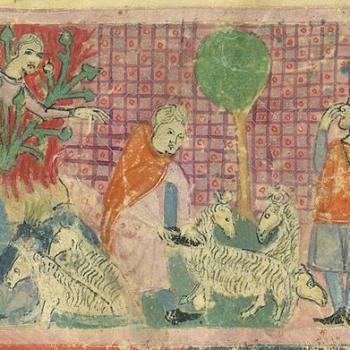This independent position of science rests in the creation of humanity according to God's image. In the Lord our God exists an independent divine thinking, which did not arise within him from out of created things, but preceded the creation of all things. He does not think because he created, but he created after having thought.
This is what we confess in the doctrine of the divine decree. Although the manifestation of the will of God also lies within the decree, yet it was firmly fixed that this will of God was directed toward what he in his wisdom had conceptualized. A decree not preceded by any reflection cannot exist. This divine thinking that preceded his decree was not the appearing of random concepts that emerged from a mystical, unconscious undercurrent of his being, as some propose, but an altogether independent thinking, in the full divine clarity of consciousness. God was inspired by no one outside himself.
This is something that Holy Scripture expresses by saying that no one has instructed him, and no one has stood alongside him as counselor. The mind of the Lord is original with him. This is why Paul asks, "For who has known the mind of the Lord, or who has been his counselor?" (Rom. 11:34). Elsewhere he asks, "For who has understood the mind of the Lord so as to instruct him?" (1 Cor. 2:16). This thought had been formulated earlier by Isaiah with these words: "Who has measured the Spirit of the Lord, or what man shows him his counsel?" (Isa. 40:13). Accordingly it must certainly be confessed that the thinking was entirely independent and original in God, from which independent and original divine thinking proceeded the decree, and from this decree the world proceeded, just as even now all the history of the world likewise proceeds.
With majestic strokes Solomon sketches this same truth for us in the book of Proverbs, when he traces for us how wisdom was with God before any created thing proceeded from his hand. In the exalted language of Proverbs 8:22-31 this is revealed to us in these stanzas:
The Lord possessed me [namely, wisdom] at the beginning of his work,
the first of his acts of old.
Ages ago I was set up,
at the first, before the beginning of the earth.
When there were no depths I was brought forth,
when there were no springs abounding with water.
Before the mountains had been shaped,
before the hills, I was brought forth,
before he had made the earth with its fields,
or the first of the dust of the world.
When he established the heavens, I was there;
when he drew a circle on the face of the deep,
when he made firm the skies above,
when he established the fountains of the deep,
when he assigned to the sea its limit,
so that the waters might not transgress his command,
when he marked out the foundations of the earth,
then I was beside him, like a master workman,
and I was daily his delight,
rejoicing before him always,
rejoicing in his inhabited world
and delighting in the children of man.
In recalling this passage, John the evangelist teaches us that this wisdom in God was the Word, and that all things were created through that Word: "In the beginning was the Word, and the Word was with God, and the Word was God. He was in the beginning with God. All things were made through him, and without him was not anything made that was made. In him was life, and the life was the light of men" (John 1:1-4). The Greek phrase used for "the Word" is ho logos, and logos means reason. Because for us reason can be dormant until it comes to full clarity in the spoken word, this phrase is not translated, "In the beginning was reason," but, "In the beginning was the Word." This expresses that God's reason is to be pictured not as existing in a dormant state, only to come to clarity, but altogether differently, as being one with his being in full clarity from eternity to eternity.
Indeed, those churches that have continuously and jealously defended the doctrine of the decree have thereby zealously sought to guard the honor of God and the pure understanding of his divine essence. By contrast, the complaint may be registered that other churches, without denying the decree but nonetheless in fact permitting it to slip out of view and ignoring it, have granted entrance to an impure concept of the being of God. From this perspective it is rather mistaken, as people often construe the matter, to suggest that the conflict between the Reformed and Methodists and other parties has been waged merely about externalities. Rather, that conflict touches the deepest point of religion itself, our confession regarding the being and the attributes of God.




